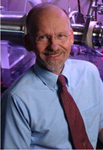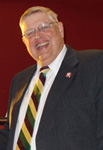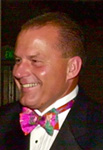

Richard D. Smith completed his doctorate degree under Jean Futrell in 1975. He is the Battelle Fellow and Chief Scientist within the Biological Sciences Division of the Pacific Northwest National Laboratory. His research interests span the development of advanced analytical methods and instrumentation, with particular emphasis on high-resolution separations and mass spectrometry and their applications in biological and biomedical research. Dick is also the Director of Proteome Research at PNNL, Director of the NIH Research Resource for Integrative Proteomics, an adjunct faculty member in the chemistry departments at Washington State and Utah State universities, and an affiliate faculty member at the University of Idaho and the Department of Molecular Microbiology & Immunology at Oregon Health & Science University. He is the author/co-author of more than 1,100 peer-reviewed journal articles and the recipient of 70 patents and 12 R&D 100 Awards.

George F. Uhlig earned his doctorate degree in 1972 under Henry Eyring while a career U.S. Air Force officer. George worked on his doctoral research and simultaneously handled projects of greater interest to the Air Force. After retiring from the Air Force in 1983 with the rank of Lieutenant Colonel, George was the head of Research and Development for Hercules Aerospace at the Bacchus Works in Magna, Utah. He then taught college chemistry courses, first at Salt Lake Community College and then at the College of Eastern Utah in Price. At CEU, he founded the only science research program at the college and inspired many students to pursue advanced education in the sciences and engineering. George retired from CEU in 2008.

Robert R. Webb was the second doctoral graduate of Gary Keck’s lab. He defended his thesis in 1982. Following an NIH-sponsored postdoctoral fellowship in the laboratory of Sam Danishefsky at Yale University, Rob took a position in the pharmaceutical industry with Bristol-Myers Squibb, working on drugs for the treatment of HIV infection and cancer. Rob then moved to Arena Pharmaceuticals in San Diego, where he helped guide key programs into development, most notably the obesity treatment APD356 (Lorcaserin). He is currently Vice President at Amplyx Pharmaceuticals.
Caroline Saouma joined the department in January 2014 as an Assistant Professor and a member of the USTAR Alternative Energy Cluster. She received her B.S. in Chemistry from MIT in 2005 and her Ph.D.in Chemistry from Caltech in 2011. She was then an NIH NRSA postdoctoral fellow at the University of Washington, working in Professor James Mayer’s lab.
Gary Keck was recognized as a Distinguished Professor by the University of Utah and was also recognized as an ACS Cope Scholar. To recognize Keck’s impact at Utah and the broader world of chemistry, the department launched an initiative to establish the Gary E. Keck Endowed Graduate Fellowship. The Keck Fellowship will support one graduate student pursuing a Ph.D. in Chemistry each year.
Cindy Burrows was elected to the National Academy of Sciences on April 29, 2014.
Luisa Whittaker-Brooks and Michael Grünwald joined the faculty in 2014.
Whittaker-Brooks earned her Ph.D. in Materials Chemistry at the University of Buffalo, State University of New York, where she was a Fulbright Fellow. She then became a Postdoctoral Research Scholar in the Department of Chemical and Biological Engineering at Princeton.
Grünwald received his Ph.D. in Computational Physics from the University of Vienna. With the support of an Erwin Schrödinger Fellowship of the Austrian Science Fund, he joined the lab of Phillip Geissler at UC Berkeley as a postdoctoral researcher. Before starting his position at the University of Utah, he was a senior postdoctoral scientist at the University of Vienna.
The Department endowed the Robert W. Parry Lectureship in Chemistry in 2014. Parry was a giant in the profession. He was the founding editor of Inorganic Chemistry in 1960. He served as the President of the American Chemical Society in 1982, won the first Utah Governor’s Medal in Science and Technology in 1987, and received the American Chemical Society’s Priestley Medal in 1993. In his 60-year career, he taught thousands of undergrads and mentored over 60 Ph.D. students and postdocs. Together with Henry Eyring and Cheves Walling, he played a key role in the growth and development of chemistry at Utah. The Parry Lectureship invites eminent inorganic chemists to present their cutting-edge research to students and faculty at an annual event that honors Parry’s memory.
Lecture Hall 2008 (HEB) was renovated in 2014, including updated teaching technology, new seating, fresh paint, and a periodic table glass panel at the back of the room.
